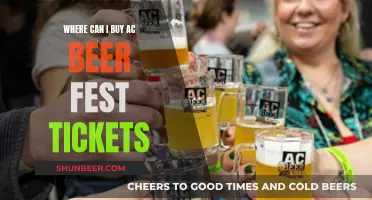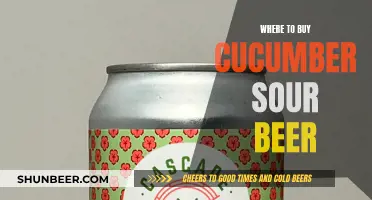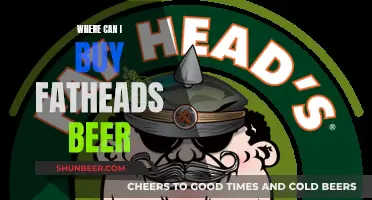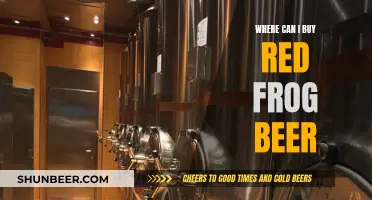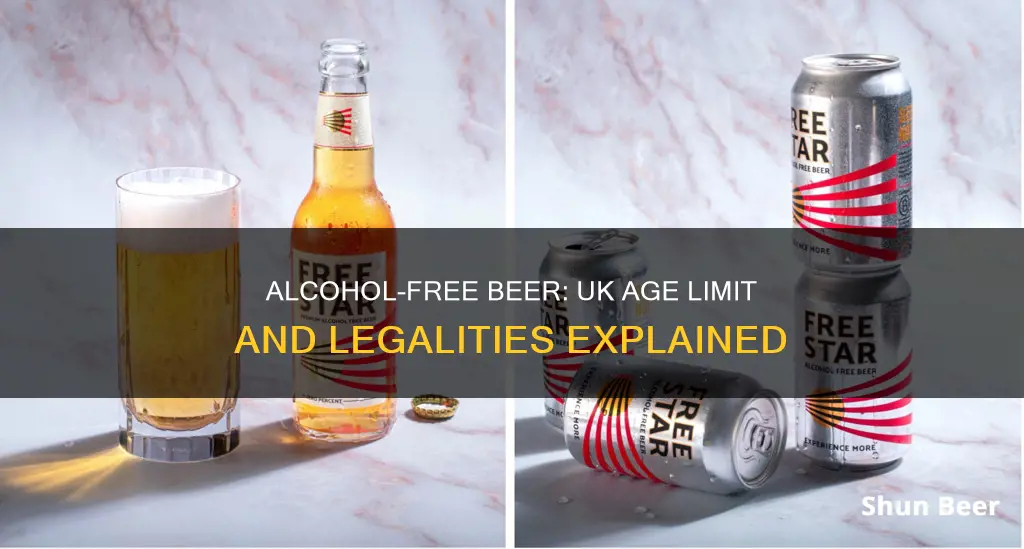
Alcohol-free beer is a drink that contains little to no alcohol by volume, usually defined as under 0.5% ABV. In the UK, there is no age restriction on the purchase of alcohol-free beer, and it can be sold to anyone as it is not legally considered alcohol. However, some pubs, bars, and shops in the UK choose to treat alcohol-free drinks the same as alcoholic drinks and will not sell them to those who cannot prove they are of legal drinking age. This is to avoid promoting alcohol to minors and to make it easier to enforce rules regarding alcoholic drinks.
| Characteristics | Values |
|---|---|
| Legal drinking age in the UK | 18 |
| Alcohol-free beer | Not more than 0.05% ABV |
| Low-alcohol beer | Over 0.05% but less than 0.5% ABV |
| Legal drinking age in the US | 21 |
| Non-alcoholic beer in the US | Less than 0.5% ABV |
What You'll Learn
- Alcohol-free beer may still contain trace amounts of alcohol
- In the UK, alcohol-free beer can be bought by under-18s
- Retailers restrict the sale of alcohol-free beer to minors to avoid promoting alcohol to children
- Alcohol-free beer is indistinguishable from alcoholic beer
- Alcohol-free beer is treated the same as alcoholic beer to make it easier to enforce rules

Alcohol-free beer may still contain trace amounts of alcohol
In the United Kingdom, Government guidance recommends the following descriptions for "alcohol substitute" drinks, including alcohol-free beer. The use of these descriptions is voluntary:
- No alcohol or alcohol-free: not more than 0.05% ABV
- Dealcoholized: over 0.05% but less than 0.5% ABV
- Low-alcohol: not more than 1.2% ABV
Alcohol-free beer does contain some alcohol – anything from trace amounts to around 0.5% ABV (alcohol by volume). In most regions, including the UK and many US states, drinks under 0.5% ABV aren't legally considered "alcohol" and aren't subject to the same restrictions as alcoholic drinks.
In the United States, beverages containing less than 0.5% alcohol by volume (ABV) were legally called non-alcoholic, according to the now-defunct Volstead Act. Because of its very low alcohol content, non-alcoholic beer may be legally sold to people under 21 in many American states.
In the UK, alcohol-free beer is often treated the same as alcoholic drinks by pubs, bars, and retailers. This means no service to anyone who can't prove they're above the legal drinking age and often no service outside of licensing or alcohol sale hours. There are two main reasons for this:
- To avoid promoting alcohol to children: Alcohol-free beer may not contain much – if any – alcohol. But the packaging and the drink itself are almost indistinguishable from alcoholic beer.
- To make it easier to enforce rules regarding alcoholic drinks: The packaging of alcohol-free beer is almost identical to that of beer that contains alcohol. This isn't much of an issue in shops, but it can be an issue in pubs and bars where owners are responsible for what people drink on the premises.
So, while alcohol-free beer may not be restricted by law in the UK, it is often treated as such by retailers to avoid promoting alcohol to minors and to simplify the enforcement of rules around alcoholic drinks.
Beer Buying in Connecticut: Case Limit Explained
You may want to see also

In the UK, alcohol-free beer can be bought by under-18s
However, despite this legislation, many pubs, bars, and shops in the UK treat alcohol-free drinks the same as alcoholic drinks. This means that they will often refuse to sell alcohol-free beer to anyone who cannot prove they are of legal drinking age, which is usually 18 years old in the UK.
The reasons for this discrepancy are twofold. Firstly, retailers want to avoid promoting alcohol to minors. Alcohol-free beer packaging and the drink itself are often indistinguishable from their alcoholic counterparts, and many alcohol-free beers are produced by companies that also make alcoholic drinks. Therefore, allowing minors to buy alcohol-free beer could indirectly promote alcoholic products to them.
Secondly, treating alcohol-free drinks the same as alcoholic drinks makes it easier for pubs, bars, and retailers to enforce rules regarding alcoholic drinks. Staff can find it challenging to distinguish between customers drinking alcohol and those drinking non-alcoholic products, so treating all drinks the same simplifies the enforcement of drinking age restrictions.
While selling alcohol-free beer to minors is not illegal in most regions, retailers voluntarily restrict these sales to protect children from the dangers of alcohol and to avoid promoting alcohol to minors.
Pennsylvania's Non-Alcoholic Beer Laws for Minors Explained
You may want to see also

Retailers restrict the sale of alcohol-free beer to minors to avoid promoting alcohol to children
In the UK, drinks under 0.5% ABV aren't legally considered "alcohol" and aren't subject to the same restrictions as alcoholic drinks. However, retailers often treat alcohol-free beer the same as alcoholic drinks and restrict their sale to minors. This is primarily to avoid promoting alcohol to children and to make it easier to enforce rules regarding alcoholic drinks.
Alcohol-free beer may not contain much alcohol, but its packaging and appearance are almost indistinguishable from alcoholic beer. Many alcohol-free and non-alcoholic beers are produced by companies that also produce alcoholic drinks. By restricting the sale of alcohol-free beer to minors, retailers can avoid indirectly promoting similar alcoholic products to them. Additionally, treating alcohol-free and alcoholic drinks the same makes it easier for retailers and pubs to enforce rules regarding the sale and consumption of alcoholic drinks, especially in settings where owners are responsible for what people drink on the premises.
Some retailers have stated that they voluntarily restrict the sale of alcohol-free drinks to avoid giving the impression that they are promoting alcohol to minors. For example, a spokesperson for Co-op said, "As a responsible retailer, we voluntarily restrict the sale of non-alcoholic drink products which resemble a beer, wine, or spirit, as we do not want to give the impression to customers that people under 18 are being permitted to purchase products that contain alcohol." Similarly, Tesco tweeted, "Hey Jon, these products are normally dealcoholized, meaning they are products aimed at adults rather than children. It would be wrong to sell such products to under 18s as they are meant as a substitute for alcohol."
While selling alcohol-free beer to minors isn't illegal in most regions, retailers are focused on society's best interests by voluntarily restricting its sale. Their ultimate aim is to protect children from the dangers of alcohol and promote responsible drinking.
When to Buy Beer in Kansas City, Missouri
You may want to see also

Alcohol-free beer is indistinguishable from alcoholic beer
In the UK, there is no legal age limit on buying alcohol-free beer. However, in practice, many pubs, bars, and shops will treat alcohol-free beer the same as alcoholic beer and refuse to sell it to minors. This is because the packaging and the drink itself are often indistinguishable from their alcoholic counterparts.
Alcohol-free beer is a relatively new product on the market, and its popularity is rising rapidly. Brewers are making amazing craft non-alcoholic beers that taste just like the real thing. In many cases, the non-alcoholic beer is indistinguishable from its alcoholic counterpart.
Non-alcoholic beers are typically brewed using one of four major methods: controlled fermentation, dealcoholization, dilution, or simulated fermentation. In all four scenarios, brewers use standard beer ingredients to maintain that familiar hoppy beer taste without the alcohol content.
Brewers on the leading edge of non-alcoholic craft beer use high-tech, top-secret methods to produce beers that taste more like traditional craft beers without adding sweeteners. The flavor is fresher, bolder, and often indistinguishable from the alcohol-containing craft beers that inspired them.
The main reason shops treat alcohol-free beer the same as alcoholic beer is to avoid promoting alcohol to children. Alcohol-free beer may not contain much alcohol, but the packaging and the drink itself are almost indistinguishable from alcoholic beer. Many alcohol-free and non-alcoholic beers are produced by companies that also produce alcoholic drinks. This means that promoting alcohol-free drinks to minors could indirectly promote similar products that contain alcohol.
Another reason is that it makes it easier to enforce rules regarding alcoholic drinks. The packaging of alcohol-free beer is almost identical to that of beer that contains alcohol. This isn't much of an issue in shops, where point-of-sale systems can flag up the differences between alcohol-free and alcoholic beer. However, it can be an issue in pubs and bars where owners are responsible for what people drink on the premises. In these cases, it makes sense to treat alcohol-free beer the same as alcoholic drinks to monitor what customers are drinking.
Thanksgiving Beer Run: Tennessee's Alcohol Laws Explained
You may want to see also

Alcohol-free beer is treated the same as alcoholic beer to make it easier to enforce rules
In the UK, drinks under 0.5% ABV aren't legally considered "alcohol" and aren't subject to the same restrictions as alcoholic drinks. However, pubs, bars, and shops often treat alcohol-free beer the same as alcoholic beer to make it easier to enforce rules regarding alcoholic drinks.
The packaging of alcohol-free beer is almost identical to that of regular beer, which can make it difficult for staff to distinguish between the two, especially in busy or crowded environments. By treating alcohol-free beer the same as alcoholic beer, pubs, bars, and shops can more easily monitor what customers are drinking and ensure that minors are not accidentally served alcoholic drinks.
Additionally, allowing minors to buy alcohol-free beer could indirectly promote alcoholic drinks to them, as many alcohol-free beers are produced by companies that also produce alcoholic beverages. By restricting the sale of alcohol-free beer to minors, retailers can avoid giving the impression that they are promoting alcohol to underage customers.
While this approach may cause inconvenience to some customers, retailers are focused on society's best interests by voluntarily restricting the sale of alcohol-free beer. Their ultimate aim is to protect children from the dangers of alcohol and to make it easier for their staff to enforce rules regarding the sale and consumption of alcoholic drinks.
Beer at the Masters: What's the Deal?
You may want to see also
Frequently asked questions
No, you don't need to be over 18 to buy alcohol-free beer in the UK. However, many retailers will still ask for ID as alcohol-free beer can contain up to 0.5% ABV.
Shops ask for ID when buying alcohol-free beer to avoid promoting alcohol to children and to make it easier to enforce rules regarding alcoholic drinks.
ABV stands for alcohol by volume.
Alcohol-free beer can contain up to 0.5% ABV.
Yes, you can drink alcohol-free beer if you're under 18. However, drinking alcohol under the age of 18 in licensed premises such as pubs and restaurants is illegal.



